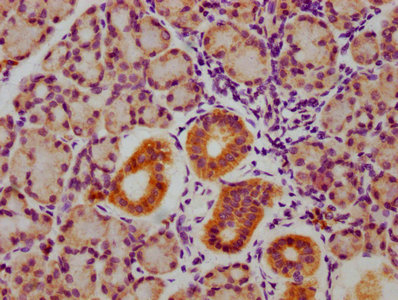
IHC image of CSB-RA009962A216phHU diluted at 1:100 and staining in paraffin-embedded human pancreatic tissue performed on a Leica BondTM system. After dewaxing and hydration, antigen retrieval was mediated by high pressure in a citrate buffer (pH 6.0). Section was blocked with 10% normal goat serum 30min at RT. Then primary antibody (1% BSA) was incubated at 4°C overnight. The primary is detected by a biotinylated secondary antibody and visualized using an HRP conjugated SP system.
Phospho-GSK3A/GSK3B (Y216 + Y279) Recombinant Monoclonal Antibody

CSB-RA009962A216PHHU
ApplicationsELISA, ImmunoHistoChemistry
Product group Antibodies
ReactivityHuman
TargetGSK3A
Overview
- SupplierCusabio
- Product NamePhospho-GSK3A/GSK3B (Y216 + Y279) Recombinant Monoclonal Antibody
- Delivery Days Customer20
- ApplicationsELISA, ImmunoHistoChemistry
- CertificationResearch Use Only
- ClonalityMonoclonal
- Clone ID4A5
- ConjugateUnconjugated
- Gene ID2931
- Target nameGSK3A
- Target descriptionglycogen synthase kinase 3 alpha
- Target synonymsglycogen synthase kinase-3 alpha; GSK-3 alpha; serine/threonine-protein kinase GSK3A
- IsotypeIgG
- Protein IDP49840
- Protein NameGlycogen synthase kinase-3 alpha
- Scientific DescriptionConstitutively active protein kinase that acts as a negative regulator in the hormonal control of glucose homeostasis, Wnt signaling and regulation of transcription factors and microtubules, by phosphorylating and inactivating glycogen synthase (GYS1 or GYS2), CTNNB1/beta-catenin, APC and AXIN1. Requires primed phosphorylation of the majority of its substrates. Contributes to insulin regulation of glycogen synthesis by phosphorylating and inhibiting GYS1 activity and hence glycogen synthesis. Regulates glycogen metabolism in liver, but not in muscle. May also mediate the development of insulin resistance by regulating activation of transcription factors. In Wnt signaling, regulates the level and transcriptional activity of nuclear CTNNB1/beta-catenin. Facilitates amyloid precursor protein (APP) processing and the generation of APP-derived amyloid plaques found in Alzheimer disease. May be involved in the regulation of replication in pancreatic beta-cells. Is necessary for the establishment of neuronal polarity and axon outgrowth. Through phosphorylation of the anti-apoptotic protein MCL1, may control cell apoptosis in response to growth factors deprivation.
- ReactivityHuman
- Storage Instruction-20°C or -80°C
- UNSPSC12352203
